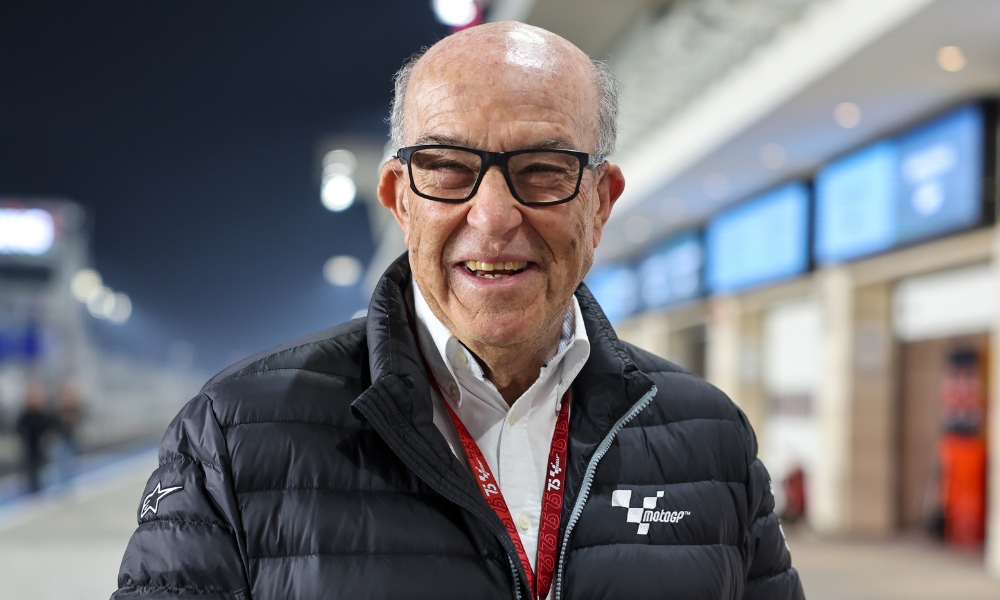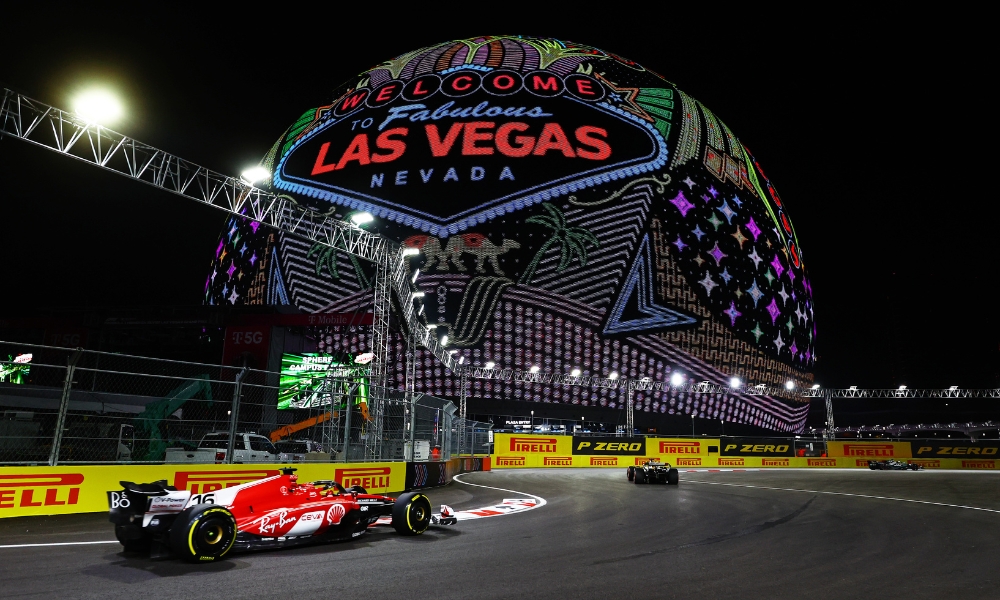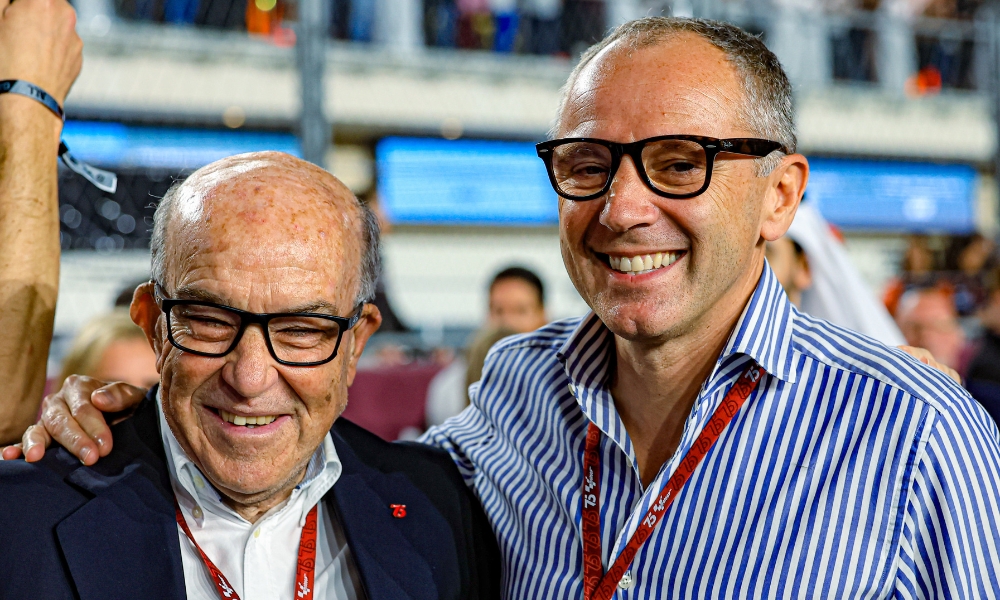2024 began with Dorna chief executive Carmelo Ezpeleta asking “who is spreading” rumours of a MotoGP sale.
Just two race weekends into the season later and the motorcycling series has a new owner in the form of Liberty Media, which is already an established name in the world of motorsport thanks to its ownership of Formula One.
Indeed, Liberty has been widely praised for its overhaul of Formula One since acquiring the global motorsport series in 2017, and MotoGP will be hopeful of emulating the success of its four-wheeled counterpart under the stewardship of the US media company.
However, ardent MotoGP fans are wary of the potential dilution of the sport they love.
Formula One is flourishing commercially, but some critics have questioned the introduction of a bloated calendar, the move from traditional circuits in favour of street tracks, and the emphasis on VIP experiences that are more accessible to A-list celebrities than the everyday motorsport fan.
Comparatively, MotoGP could make an argument for having the strongest on-track offering of any global motorsport series, but has failed to adequately promote its product in recent years. Liberty’s expertise in this area, which has been headlined by the success of the Drive to Survive docuseries on Netflix, could therefore prove valuable.
But what does the takeover mean for MotoGP in the immediate and long term, will it be approved by competition regulators, and will there be a knock-on effect for Formula One? BlackBook Motorsport digs into the detail and chats to Dorna chief commercial officer Dan Rossomondo to answer the key questions.
"This is the perfect next step in the evolution of MotoGP, and we are excited for what this milestone brings to Dorna, the #MotoGP paddock and racing fans"
— MotoGP™🏁 (@MotoGP) April 1, 2024
– Carmelo Ezpeleta, CEO of Dorna 💬 pic.twitter.com/9E9dCbJaAH
What is changing?
In layman’s terms, the ownership structure of MotoGP is being simplified.
The series’ commercial rights have been controlled since 1992 by Spanish company Dorna, which is headed up by its aforementioned chief executive Ezpeleta.
The company was sold to CVC Capital Partners in 1998 but, after the private equity firm purchased Formula One, EU competition regulators stepped in to prevent the company from owning both series.
As a result, CVC opted to jettison MotoGP and another private equity firm, Bridgepoint, became Dorna’s majority shareholder in 2006. The British company controlled around 40 per cent of Dorna, with a significant share also held by the Canada Pension Plan Investment Board, which purchased a stake in the Spanish company in 2012.
Both investors are now exiting after Liberty agreed to pay a reported €4.2 billion (US$4.5 billion) to acquire approximately 86 per cent of the shares in Dorna, which will retain around 14 per cent of equity in the business.
How will Dorna’s leadership be affected?
Despite the takeover, not much will change from a leadership perspective – at least in the short term.
Dorna will retain operational control and remain an independently run company. Ezpeleta will also continue as chief executive, ensuring continuity behind the scenes. This will give Liberty time to understand the series without disrupting the management early on.
When Liberty purchased Formula One, one of its first moves was to install Chase Carey as chief executive, which proved to be a shrewd commercial move despite the American not having a background in racing. After four years in the role, he was replaced by Stefano Domenicali, who served the Ferrari Formula One team for over 20 years, including as team principal between 2008 and 2014.
With these learnings from its initial years in Formula One, it wouldn’t be a surprise to see Liberty Media opt for continuity, especially with the experience Ezpeleta has leading the series.
“What Liberty brings to the table is the investment mindset,” Rossomondo tells BlackBook Motorsport. “They’re going to want a return, but I think they understand that there’s things that they can do on the investment side to help with the exposure of the sport. They have great expertise in scaling global sports entertainment properties, and I think that’s invaluable.”

Carmelo Ezpeleta first joined Dorna in 1991 as director of the motorsport department, before becoming chief executive in 1994
Will EU regulators approve the deal?
One major issue that may scupper the deal from even being finalised is the same problem that CVC faced in 2006, when EU competition regulators decided the private equity firm had to sell one of MotoGP or Formula One.
Whether Liberty will be given a similar ultimatum remains to be seen, but it would be a surprise to see regulators move to block the takeover. Simply put, the world of motorsport is very different in 2024 compared to 2006. While unprecedented, owning two global motorsport series is not as market-altering now as it would have been 18 years ago. In truth, Formula One and MotoGP operate at entirely different levels of popularity today.
Plus, the likes of Formula One and MotoGP are now in competition with so much more than just other sports properties, let alone other motorsport series.
When addressing the issue during an investor call, Maffei said he was “very confident” the takeover would be cleared by regulators and be completed on schedule by the end of the year.
Does this mean Liberty is open to a Formula One sale?
If EU regulators decide that a precedent was set in 2006 and that a company cannot control both series, then things could get interesting. Liberty surely will have known this was a possibility going into negotiations, which may suggest it was aware of the potential implications for its ownership of Formula One.
If reports are to be believed, Liberty rejected a US$20 billion offer from Saudi Arabia’s Public Investment Fund (PIF) to buy Formula One last year. Having originally purchased the series for around US$4.4 billion in 2017, the company would be in line to make an eye-watering profit if it opted to sell the property soon, and may be tempted to cash in if it struggles to secure regulatory approval.
Formula One’s boom in popularity has been overshadowed in recent times by the lack of competition on the track, with the majority of Grands Prix serving up processionary racing with predictable results.
If viewers continue to turn away from Formula One – and Liberty shareholders begin to question the series’ direction – then settling for a substantial profit and investing in a different motorsport with significant growth potential could make a lot of commercial sense.

Liberty Media’s Formula One legacy may come to be defined by the success of the Las Vegas Grand Prix
Are some fans right to be concerned about the deal?
Whether or not the deal is cleared, the initial reaction from ardent MotoGP fans has been far from positive.
Many hardcore fans see the commercialisation of Formula One as too far detached from the essence of motorsport, although some of the issues raised on social media were associated with the series long before Liberty took over.
Motorsport fans have always been resistant to change, but Rossomondo acknowledges the concerns.
“In surveys that we’ve done with major publications, we found that around seven in every ten fans want there to be more fans in MotoGP,” he says. “They love the sport, but they also want to share it with people. This is what we’re going to be able to do with this partnership.
“We want to make it more efficient, we want to make it safer, we want to make it more competitive. [The fans] want that too because they want the commercial side to flourish. I think from a fan’s perspective, I don’t ask them to take a beat, but take a beat. We have a long way to go before we’re an over-the-top, Las Vegas glitz and glamour sport.”
If MotoGP is to grow, then fans will have to accept that change is coming. In any case, Dorna retaining an element of control should ease concerns and prevent any kind of radical evolution in the early stages of Liberty’s tenure.
- MotoGP’s CCO on bringing an NBA mindset, envying F1, and creating the most exciting championship
- MotoGP on the market: Does the series’ commercial performance justify a US$4bn valuation?
- ‘There are things we have to do better’: How MotoGP plans to get back on track
What are the major issues Liberty needs to address?
Securing exposure has been MotoGP’s primary obstacle for many years, but even more so after the retirement of Valentino Rossi, an icon that any sport would struggle to replace.
Regardless, MotoGP has failed to attract wider attention despite offering a competitive product, and a lot of that comes down to the marketing of the series. Given the success Liberty has had in building the audience of Formula One, MotoGP will be hoping its new owner brings ideas for growing its reach.
“From our perspective, it’s ‘how can they help us expose the sport to more people?’,” Rossomondo explains. “You may have heard [Liberty Media chief executive] Greg Maffei on the investor call say they’re not going to tinker with the sport, they think the sport is wonderful.
“We always have to make changes and modifications based on technology and safety and all that, but the sport itself is very visceral. It’s very fun and exciting. So they just really want to focus on the exposure side of this.”
This aligns with the widely held view that Dorna has succeeded in developing the on-track offering, even if the marketing of that offering has been falling short. Still, that doesn’t mean Liberty should simply replicate what worked in Formula One and hope it has the same impact for MotoGP, which has its own nuances and fanbase.
“There’s a disservice done to Liberty when people say that all their success is due to Drive to Survive,” Rossomondo argues. “I think they’ve done a lot of things outside that to make it a success, but it’s not a copy and paste.
“We have to do a lot of work: we have to know a lot more about who our fan is, who our customer is, we have to understand what their interests are outside of the circuits, and we have to deliver a really great premium product – from the circuits to our digital offerings and television product.”

Which markets will be most of interest to Liberty?
As with Formula One, Liberty’s focus is likely to be the US. Unlike with Formula One, though, much of the initial groundwork has already been done for them.
Nascar team Trackhouse Racing expanded into the world of motorcycle racing at the start of this season, which now looks like an expertly timed move from team owner Justin Marks prior to the Liberty acquisition.
This US focus has also generated talk of a second MotoGP race in the country, with Flatrock Motorsports Park in Tennessee hoping to add to the established event at the Circuit of The Americas in Austin, Texas.
While Rossomondo has been pushing for MotoGP to expand its US presence, he is fine with Liberty taking the credit if it proves successful.
“If there’s one thing I cared less about, it’s who gets the credit,” he laughs. “Luck is the residue of hard work, so I love to get lucky a lot by working hard. If they take credit for it, that’s great. I’m just excited that there’s someone who sees the opportunity and wants to invest in it.”
Outside of the US though, there are plenty of opportunities for MotoGP to expand. Discussions have been held about racing in Brazil, while the Middle East continues to be a destination for motorsport series looking further afield.
Rossomondo also singles out China as a dream location for the series, but he is wary of the series setting its sights too broad.
“My back hurts thinking about all the flights I’ll be on this year,” he adds. “For us, it’s getting that right mix with Europe where our heritage is.”
How far will Liberty carry MotoGP?
If Liberty is half as successful with MotoGP as it has been with Formula One, then this deal would likely be viewed as a triumph for both sides.
For Rossomondo, replicating Formula One’s trajectory is the obvious goal, but that needs to be balanced with retaining what makes MotoGP unique.
“I would love for that growth trajectory to happen, whoever wants the credit for it I would let them have it, but I would love for that to be our growth trajectory,” he continues.
“Although, what we want to do is keep what makes us so special, keep that while expanding. If you look at some of the greatest brands out there, it’s like they reach this point where maybe they’ve expanded too much and that loses who they are, and then they have to retrench.
“We want to build this very intelligently, very aggressively, but we want to make sure that we keep what makes us special and inherent to who we are.”
BlackBook Motorsport Forum is back for its 10th anniversary edition. Join us in London this April to navigate the transformation of motorsport and the trends driving the industry forward into the next decade.

